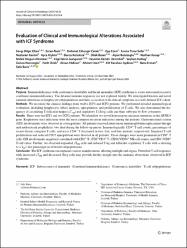Evaluation of Clinical and Immunological Alterations Associated with ICF Syndrome

View/
Access
info:eu-repo/semantics/openAccessDate
2024Author
Bilgic Eltan, SevgiNain, Ercan
Catak, Mehmet Cihangir
Ezen, Ege
Sefer, Asena Pinar
Karimi, Nastaran
Kiykim, Ayca
Kolukisa, Burcu
Baser, Dilek
Bulutoglu, Alper
Kasap, Nurhan
Yorgun Altunbaş, Melek
Yalçın Güngören, Ezgi
Kendir Demirkol, Yasemin
Kutlug, Seyhan
Hancioglu, Gonca
Dilek, Fatih
Yıldıran, Alişan
Ozen, Ahmet
Karakoc-Aydiner, Elif
Erman, Batu
Baris, Safa
Metadata
Show full item recordCitation
Bilgic Eltan, S., Nain, E., Catak, M. C., Ezen, E., Sefer, A. P., Karimi, N., ... KIYKIM, A.(2024). Evaluation of Clinical and Immunological Alterations Associated with ICF Syndrome. Journal of Clinical Immunology , vol.44, no.1.Abstract
Purpose: Immunodeficiency with centromeric instability and facial anomalies (ICF) syndrome is a rare autosomal recessive combined immunodeficiency. The detailed immune responses are not explored widely. We investigated known and novel immune alterations in lymphocyte subpopulations and their association with clinical symptoms in a well-defined ICF cohort. Methods: We recruited the clinical findings from twelve ICF1 and ICF2 patients. We performed detailed immunological evaluation, including lymphocyte subset analyses, upregulation, and proliferation of T cells. We also determined the frequency of circulating T follicular helper (cTFH) and regulatory T (Treg) cells and their subtypes by flow cytometry. Results: There were ten ICF1 and two ICF2 patients. We identified two novel homozygous missense mutations in the ZBTB24 gene. Respiratory tract infections were the most common recurrent infections among the patients. Gastrointestinal system (GIS) involvements were observed in seven patients. All patients received intravenous immunoglobulin replacement therapy and antibacterial prophylaxis; two died during the follow-up period. Immunologically, CD4+ T-cell counts, percentages of recent thymic emigrant T cells, and naive CD4+ T decreased in two, five, and four patients, respectively. Impaired T-cell proliferation and reduced CD25 upregulation were detected in all patients. These changes were more prominent in CD8+ T cells. GIS involvements negatively correlated with CD3+ T-, CD3+CD4+ T-, CD16+CD56+ NK-cell counts, and CD4+/CD8+ T-cell ratios. Further, we observed expanded cTFH cells and reduced Treg and follicular regulatory T cells with a skewing to a TH2-like phenotype in all tested subpopulations. Conclusion: The ICF syndrome encompasses various manifestations affecting multiple end organs. Perturbed T-cell responses with increased cTFH and decreased Treg cells may provide further insight into the immune aberrations observed in ICF syndrome.
















